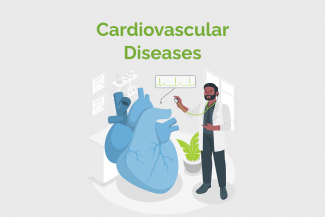Hypertension, High Cholesterol, Heart Disease, High Blood Pressure

Cardiovascular Conditions need to managed at multiple levels:
Treatment options: Please refer to http://www.patientsengage.com/conditions/cardiovascular-diseases/treatments
Food and nutrition
Heart disease patients are recommended the following diet:
- A heart-healthy diet is low in salt, saturated fat, trans fat, cholesterol and refined sugars. Avoid animal fats, butter, margarine. Foods containing monounsaturated fat, polyunsaturated fat (olive oil, safflower oil, peanut oil) and omega 3 fatty acids (fish) are good for heart patients. Keep your salt consumption in the range of 1500mg-2300mg (1 teaspoon) per day.
- Always choose lean proteins like fish, beans, skinless poultry, nuts and low fat dairy
- Eat wholegrains like wholewheat flour, oatmeal or wholegrain pasta
- Increase your intake of foods rich in vitamins and other nutrients, especially antioxidants ( Vitamin E, beta carotene) which have been proven to lower risk for heart disease.
- Eat plant-based foods such as fruits, vegetables, nuts and whole grains.
Physical fitness
Exercise every day for 30 minutes. But consult your doctor before embarking on any physical exercise programme. The intensity of the exercise will depend on your heart condition.
Complications
Unmanaged heart disease puts you at heightened risk for the the following:
- Heart attack
- Stroke
- Aneurysm
- Sudden cardiac arrest
Take charge: Your Action Plan
- Quit smoking
- Maintain healthy weight
- Manage your blood pressure and diabetes
- Watch your diet
- Exercise regularly
- Manage stress
- Have regular check ups with your doctor
- Ask your doctor about taking aspirin (80-160mg once a day) for primary prevention
Know your support team: Who can help you stay healthy?
- General physician
- Cardiologist
- Nutritionist
- Fitness expert
Changed
12/Sep/2017
Community
Condition









